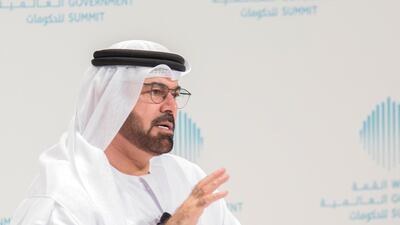Building the next generation of future governments requires stronger international partnerships and collaboration, adopting innovation to prepare for future challenges and adapting with emerging requirements, Mohammad Abdullah Al Gergawi, Minister of Cabinet Affairs, said.
His comments came after the UAE joined the "agile nations" network, a group of seven countries that aim to foster government innovation, create a regulatory environment to support innovation and adopt innovative solutions to prepare for future challenges.
“UAE government is proud to endorse the Agile Nations network, which would help adopt agile governance and innovation to build strong, capable, and resilient governments, and enable them to tackle future challenges with proactive solutions," Ohood bint Khalfan Al Roumi, Minister of State for Government Development and the Future, said.
The charter was signed during “Agile Governance for the Post-Pandemic World” panel organised by the World Economic Forum (WEF) and the Organisation for Economic Cooperation and Development (OECD). It hosted 15 government officials and private sector executives to discuss ways to redesign rulemaking by adopting innovative government models to drive economic growth, social development and entrepreneurship.
The charter proposes promoting good practices when setting new rules, ensuring that regulation is technology-neutral and that any guidance or industry standards allow for the introduction and scaling up of new technology. It also encourages methods to allow businesses to pilot and test innovations, such as through regulatory sandboxes, in a way that supports "fair and open competition".
Nations who signed the charter also agreed to foster mutual cooperation on rulemaking for innovation and promote good practice by encouraging wider cooperation.
During the virtual panel held to sign the agreement, the OECD established a framework for its 37-member states on effective and innovation-friendly rulemaking in the Fourth Industrial Revolution, which will be adopted in 2021.
"The Agile Nations network is an extremely timely initiative to truly foster international regulatory cooperation for better, innovation-friendly and up-to-date regulations worldwide," Jeffrey Schlagenhauf, deputy secretary-general of the OECD said.
WEF also published a guide to better regulation of emerging technologies.
"Too often, rules and laws are designed with the past in mind,” said Murat Sönmez, managing director of WEF, said. “Our Centres for the Fourth Industrial Revolution help governments, businesses and citizens co-design for the future – enabling the innovation that will be needed to create jobs, maintain competitiveness and ensure resilience to shocks.”
The UAE joined Canada, Denmark, Italy, Japan, Singapore, and the UK in signing the "agile nations" agreement. The charter will pave the way for governments to share their strategic plans to promote innovation and discuss how the Fourth Industrial Revolution can enhance the way governments function, manage operations and deliver services.
The charter supports using innovation to accelerate economic growth and design solutions to social and environmental challenges in priority areas including green technology, data and communication, financial services, rulemaking and legislations, medical diagnosis and treatment, as well as mobility.
Global technology companies such as IBM and Facebook will implement the charter to back emerging technology companies and innovative projects in testing new ideas.

